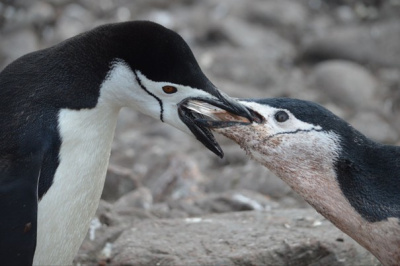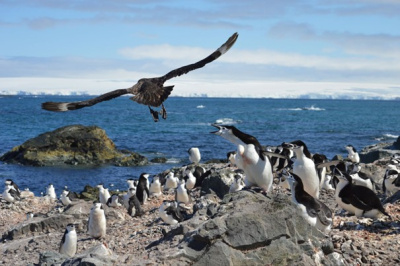
Photo dr Lucas Krüger
Education for sustainable management and protection of Antarctic marine living resources is the main objective of the two-year project ‘International Cooperation for Education on Sustainable Management and Protection of Antarctic Living Marine Resources and Ecosystems - AntarCTic Partnership of UG and INACH ICEPACT’. The project, co-implemented by the University of Gdańsk and the Instituto Antártico Chileno (INACH), has received funding from the NAWA Strategic Partnerships programme in the amount of PLN 1,325,517.50. The project is headed by Dr Anna Panasiuk from the Faculty of Oceanography and Geography at the University of Gdańsk. A key component of the project will be research on the migration patterns of Antarctic birds, including penguins.
The Instituto Antártico Chileno (INACH) is a public institution responsible for coordinating scientific research in the Antarctic region. The project manager on the INACH side is Dr Lucas Krüger. Under the NAWA Strategic Partnerships programme, the project received the maximum funding requested in the amount of PLN 1,325,517.50.
The project activities include:
- a course for UG/SEA-EU students on monitoring methods used in polar regions, including Antarctica,
- internships for UG/SEA-EU students at INACH and in Antarctica,
- internships for INACH students at UG,
- research on seabird migration in Antarctica, including penguins of the genus Pygoscelis, during the winter period,
- training and scientific consultations for UG staff at INACH,
- preparation of a teaching script for the course for students.

Dr Anna Panasiuk's research focuses on Antarctic zooplankton, including the ecology of Antarctic krill and its predators, such as penguins and whales. Her team also studies pollution present in krill and in the organisms of the aforementioned predators. Her research projects also include a project carried out in cooperation with a German partner on fin whales in Antarctica, analysing their main areas of occurrence in the context of abiotic and biotic environmental characteristics. At the beginning of this year, Dr A. Panasiuk was appointed Poland's representative to the Scientific Committee of the Commission for the Conservation of Antarctic Marine Living Resources (CCAMLR). The currently planned research on the winter migration of Antarctic birds will help to better understand the primary origin of pollutants recorded in Antarctic predators and assess the degree of overlap between feeding grounds and fishing areas.
‘It's a kind of love at first sight that grabs you and never lets go,’ said Dr Anna Panasiuk about her fascination with Antarctica after being appointed to the CCAMLR. ‘Antarctica is the last area not permanently inhabited by humans, it is home to many species whose adaptations to life in these harsh conditions continue to amaze us. I have been travelling to Antarctica on scientific missions since 2007 and I can see the changes it is undergoing. On the one hand, this is saddening, but on the other, it motivates me to work even harder, which may contribute to more intensive protection of this environment. I will be a fully fulfilled oceanographer and Antarctic marine biologist if even a small part of my scientific work and its results contribute to the more effective protection of Antarctica.’
We hope that the next project, this time in cooperation with a Chilean partner, will bring just such results!
For the latest information on the implementation of further project tasks, please follow the WOiG website: Home page | Faculty of Oceanography and Geography, University of Gdańsk.


